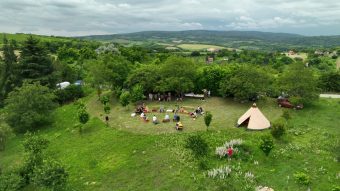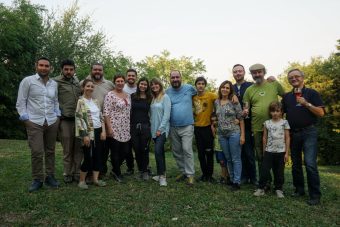
WWF launched its project “Serbia Actions in the Field of Environment, Nature and Climate – SAFE Nature and Climate“ to form a network of civil society organizations that will implement sustainable ideas related to environmental and climate protection.
After the two-stage evaluation procedure, the expert team decided to support five organizations following the second competition with grants of a maximum of EUR 18,000.
FORCA – Požega Civil Action Forum
It is estimated that around 1,200 tons of pesticide packaging waste are produced annually in Serbia, which is classified as hazardous waste and must be collected and disposed of because it pollutes the soil, water and air and negatively affects the health of people, plants and animals.
Without a systemic solution, this waste is incinerated in 70 per cent of cases, which generates greenhouse gases. For this reason, the improper management of this waste is one of the causes of global warming and climate change. The municipality of Požega has no legal regulation on this matter.
The goal of this project is to establish a system, connect all actors in the management chain of this waste and launch an initiative for the development of local policies and practices, which would clearly define the responsibilities and obligations of local governments, public utility companies, Agricultural Advisory Service and agricultural producers and operators.
IN FOCUS:
- EFFECTIVE APPLICATION OF THE GREEN CONSTRUCTION PRINCIPLES, EMPLOYEE EDUCATION AND PARTNERS
- CHARGE&GO EXPANDS ITS NETWORK TO THE REGIONAL MARKET IN 2024
- SUPPORTING A BETTER LIFE FOR CITIZENS AND A MORE ENVIRONMENTALLY RESPONSIBLE SOCIETY
GRES – Group for the Development of Environmental Awareness

In Europe, the annual production of plastics is measured in tens of millions of metric tons (source: Plastics Europe, 2019). A rough estimate predicts that 80 per cent of plastic waste in marine ecosystems originates from land and is transported via rivers.
The primary sources of microplastics (MP) are factory particles, fibrils (fibres) or spherical microparticles used in cosmetic products, the textile industry, etc. The degradation of macroplastics under the influence of physical, biological and chemical processes creates MP, which is characterized as a secondary source. MP includes particles between 1 μm and 5 mm in size.
The GRES project aims to contribute to the resolution of this problem in our country. It is envisaged to review the presence of MP particles, monitoring methodology and legal regulations, as well as the formation of a national microplastics centre (microplastics.rs) under the auspices of the Siniša Stanković Institute for Biological Research/Institute of National Importance for the Republic of Serbia, at the University of Belgrade (IBISS).
Karlovci Vineyards Association
The town of Sremski Karlovci is located near the Danube, the Fruška Gora National Park and the zone of influence of the Special Nature Reserve Koviljsko-Petrovaradinski Rit. The association believes that the understanding of the importance of this landscape as an ecological corridor that connects three protected natural assets is still not sufficiently understood or covered both in municipal documents and practice.
The result of these inconsistencies is reflected in the spatial planning decisions of the municipality and documents related to strategic development, which stipulate the formation and development of the Prosjanica work zone, where companies would produce products that might negatively affect the environment.
The Karlovci Vineyards Association is playing the role of a public advocate in its interactions with the municipal authorities with the view of promoting and including sustainable agriculture and ecotourism in the development plan, which can establish a link between the local community and environmental protection in the best possible way.
The project focuses on the analysis of environmental protection problems in the municipality of Sremski Karlovci, including the lack of relevant data and omissions in spatial planning documentation, which represents a significant challenge and inconsistency in environmental protection at the local level.
Prepared by: Milica Radičević
Read the story in the new issue of the Energy portal Magazine RESPONSIBLE BUSINESS



